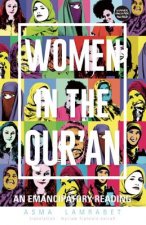
Kód: 04641134
Islam and Mammon
Autor Timur Kuran
The doctrine of 'Islamic economics' entered debates over the social role of Islam in the mid-twentieth century. Since then it has pursued the goal of restructuring economies according to perceived Islamic teachings. Beyond its mos ... celý popis
- Jazyk:
 Angličtina
Angličtina - Vazba: Brožovaná
- Počet stran: 240
Nakladatelství: Princeton University Press, 2005
- Více informací o knize

1339 Kč

Skladem u dodavatele v malém množství
Odesíláme za 12-17 dnů
Potřebujete více kusů?Máte-li zájem o více kusů, prověřte, prosím, nejprve dostupnost titulu na naši zákaznické podpoře.
Přidat mezi přání
Mohlo by se vám také líbit
-

Long Divergence
982 Kč -

Economic Interpretation of the
458 Kč -

Only Children Of The Universe Are We
620 Kč
Darujte tuto knihu ještě dnes
- Objednejte knihu a zvolte Zaslat jako dárek.
- Obratem obdržíte darovací poukaz na knihu, který můžete ihned předat obdarovanému.
- Knihu zašleme na adresu obdarovaného, o nic se nestaráte.
Více informací o knize Islam and Mammon
Nákupem získáte 134 bodů
 Anotace knihy
Anotace knihy
The doctrine of 'Islamic economics' entered debates over the social role of Islam in the mid-twentieth century. Since then it has pursued the goal of restructuring economies according to perceived Islamic teachings. Beyond its most visible practical achievement - the establishment of Islamic banks meant to avoid interest - it has promoted Islamic norms of economic behavior and founded redistribution systems modeled after early Islamic fiscal practices. In this bold and timely critique, Timur Kuran argues that the doctrine of Islamic economics is simplistic, incoherent, and largely irrelevant to present economic challenges. Observing that few Muslims take it seriously, he also finds that its practical applications have had no discernible effects on efficiency, growth, or poverty reduction.Why, then, has Islamic economics enjoyed any appeal at all? Kuran's answer is that the real purpose of Islamic economics has not been economic improvement but cultivation of a distinct Islamic identity to resist cultural globalization. The Islamic subeconomies that have sprung up across the Islamic world are commonly viewed as manifestations of Islamic economics. In reality, Kuran demonstrates, they emerged to meet the economic aspirations of socially marginalized groups. The Islamic enterprises that form these subeconomies provide advancement opportunities to the disadvantaged. By enhancing interpersonal trust, they also facilitate intragroup transactions. These findings raise the question of whether there exist links between Islam and economic performance. Exploring these links in relation to the long-unsettled question of why the Islamic world became underdeveloped, Kuran identifies several pertinent social mechanisms, some beneficial to economic development, others harmful.
 Parametry knihy
Parametry knihy
Zařazení knihy Knihy v angličtině Society & social sciences Society & culture: general Social groups
1339 Kč
- Plný název: Islam and Mammon
- Podnázev: The Economic Predicaments of Islamism
- Autor: Timur Kuran
- Jazyk:
 Angličtina
Angličtina - Vazba: Brožovaná
- Počet stran: 240
- EAN: 9780691126296
- ISBN: 0691126291
- ID: 04641134
- Nakladatelství: Princeton University Press
- Hmotnost: 352 g
- Rozměry: 227 × 154 × 13 mm
- Datum vydání: 25. December 2005
Oblíbené z jiného soudku
-

Women Who Run with the Wolves
239 Kč -

Freedom Writers Diary
277 Kč -

Think Like a Monk
441 Kč -

Orientalism
306 Kč -

How Europe Underdeveloped Africa
530 Kč -

Desert Flower
286 Kč -

Why Does He Do That?
400 Kč -

Letters to a Young Muslim
303 Kč -

Eros and Mysteries of Love
407 Kč -

Life After Darkness
512 Kč -

Puer Tea
772 Kč -

Womanhood
544 Kč -

JFK - 9/11
734 Kč -

Complete Book of Pilates for Men
447 Kč -

Gypsy Identities 1500-2000
1641 Kč -

Servitors of Empire
477 Kč -

Sword of No-sword
646 Kč -

Colloquial Yiddish
1683 Kč -

Gerotranscendence
3473 Kč -

Northwest Coast Indian Art
721 Kč -

Qur'an
811 Kč -

When God Was A Woman
497 Kč -

The Mastery of Love
306 Kč -

Vintage Menswear
435 Kč -

Who Cooked the Last Supper?
428 Kč -

Women Who Run With The Wolves
410 Kč -

The Way of Men
332 Kč -

The Autobiography of Malcolm X
224 Kč -

Second Sex
410 Kč -

Goddesses in Everywoman
303 Kč -

Talking with Female Serial Killers - A chilling study of the most evil women in the world
276 Kč -

Intellectuals and Society
537 Kč -

Women in the Qur'an
493 Kč -

Erotic Bondage Book
364 Kč -

Zami
276 Kč -

Nine Years among the Indians, 1870-1879
619 Kč -

Dark Emu
410 Kč -

Childhood and Society
392 Kč -

Happy City
303 Kč -

The Male Nude
481 Kč -

The Bell Curve
464 Kč -

We Should All Be Feminists
213 Kč -

Empire of the Summer Moon
357 Kč -

Radium Girls
276 Kč -

Dance of Anger
276 Kč -

Beauty Myth
357 Kč -

Muqaddimah
541 Kč -

TROUBLEMAKER
363 Kč -

Ladies' Book of Etiquette and Manual of Politeness
306 Kč
Osobní odběr Praha, Brno a 12903 dalších
Copyright ©2008-24 nejlevnejsi-knihy.cz Všechna práva vyhrazenaSoukromíCookies


 Vrácení do měsíce
Vrácení do měsíce 571 999 099 (8-15.30h)
571 999 099 (8-15.30h)